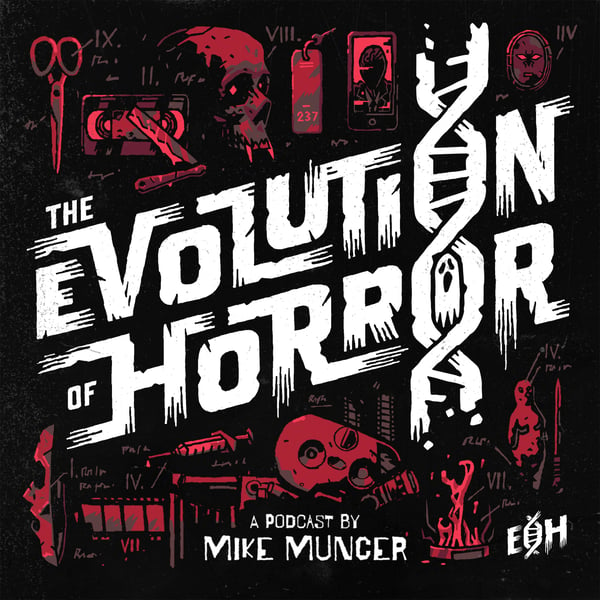VAMPIRES: Pt 4 - Dracula (1931) & The Universal Era
The Evolution of Horror
Mike Muncer
4.8 • 1.7K Ratings
🗓️ 26 May 2022
⏱️ 95 minutes
🧾️ Download transcript
Summary
This week Mike is joined by filmmaker Axelle Carolyn to discuss arguably the most influential horror film ever made: Tod Browning's Dracula (1931)! After that, they look at the subsequent Dracula movies from the Universal Monsters era: Dracula's Daughter (136), Son of Dracula (1943), House of Frankenstein (1944), House of Dracula (1945) and Abbot and Costello Meet Frankenstein (1948).
We're hosting a LIVE PODCAST event! Grab yourself a ticket for our live show with special guests at Sundance London!
CLICK HERE FOR TICKETS
Win yourself free tickets to see VAMPYR on the big screen for it's 90th anniversary at the Genesis Cinema in London on 6th June! Click here to enter on Twitter
Music by Jack Whitney.
Visit our website www.evolutionofhorror.com
Buy tickets for our next upcoming EVOLUTION OF HORROR PRESENTS screening at the Genesis Cinema!
www.evolutionofhorror.com/genesis
You can now buy Evolution of Horror merch on our TeePublic store!
www.evolutionofhorror.com/merchandise
Subscribe and donate on PATREON for bonus monthly content and extra treats...
www.patreon.com/evolutionofhorror
Follow us on TWITTER
Follow us on INSTAGRAM
Like us on FACEBOOK
Join the DISCUSSION GROUP
Join our DISCORD
Follow us on LETTERBOXD
Mike Muncer is a producer, podcaster and film journalist and can be found on TWITTER
Transcript
Click on a timestamp to play from that location
| 0:00.0 | Throughout the 1920s, universal pictures were on the up. Founded by Carl Lemley a few |
| 0:28.5 | years earlier, universal weren't yet competing with some of the other bigger Hollywood studios, |
| 0:34.4 | such as MGM or Paramount, but they had started achieving success with frightening mystery |
| 0:40.7 | movies, such as The Phantom of the Opera and The Cat and the Canary. During this time, universal |
| 0:47.9 | bought the rights to Dracula, both the novel and the stage plays, for $40,000. At the time, |
| 0:55.2 | the stage play was proving to be a huge success in Broadway and Universal's current head of |
| 1:01.1 | production, Carl Lemley's son, Carl Lemley Jr. saw the box office potential in the first ever |
| 1:08.6 | authorised screen adaptation of Dracula. Rather than remaining faithful to the novel, this new film |
| 1:15.4 | adaptation would use the stage play as a blueprint, but would also borrow German expressionist visuals |
| 1:21.9 | from the previously unauthorised adaptation Nosferatu. The role of Count Dracula was originally |
| 1:29.2 | intended for Lon Cheney, an actor who had terrified audiences throughout the previous decade, |
| 1:35.0 | with mesmerising transformative performances in The Phantom of the Opera and the hunchback of |
| 1:40.8 | Notre Dame. But after Cheney's unexpected and sudden death in 1930, Universal instead |
| 1:48.3 | cast a Hungarian actor called Bella Legosi, who had played Dracula on stage and had lobbied hard |
| 1:55.4 | to land the role in the film. And so, by bringing together elements of the stage play, |
| 2:01.2 | the original novel, the German expressionist visuals and a striking lead performance by Bella |
| 2:07.9 | Legosi, Carl Lemley Jr. Todd Browning and the rest of Universal Pictures would end up |
| 2:14.6 | making one of the most important films in cinema history, the film that arguably created the |
| 2:21.5 | template for what we now recognise as horror cinema. I am Dracula. |
| 2:31.8 | Join me as we continue exploring the evolution of the vampire and we discuss the original |
| 2:37.4 | Universal Monster movie, Dracula. |
| 2:49.2 | Welcome to the evolution of horror. My name is Mike Muncer and as ever, I am your host. |
... |
Please login to see the full transcript.
Disclaimer: The podcast and artwork embedded on this page are from Mike Muncer, and are the property of its owner and not affiliated with or endorsed by Tapesearch.
Generated transcripts are the property of Mike Muncer and are distributed freely under the Fair Use doctrine. Transcripts generated by Tapesearch are not guaranteed to be accurate.
Copyright © Tapesearch 2025.

